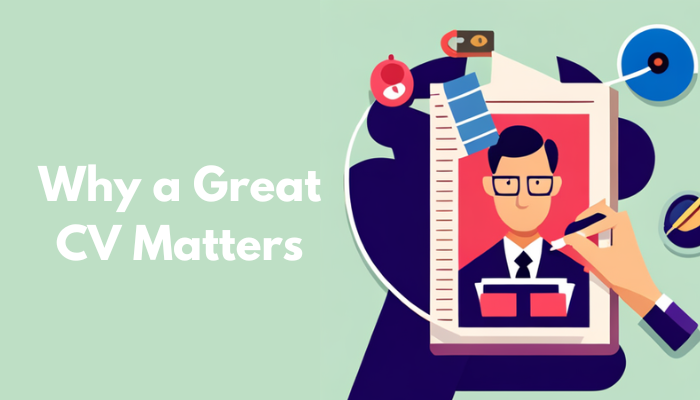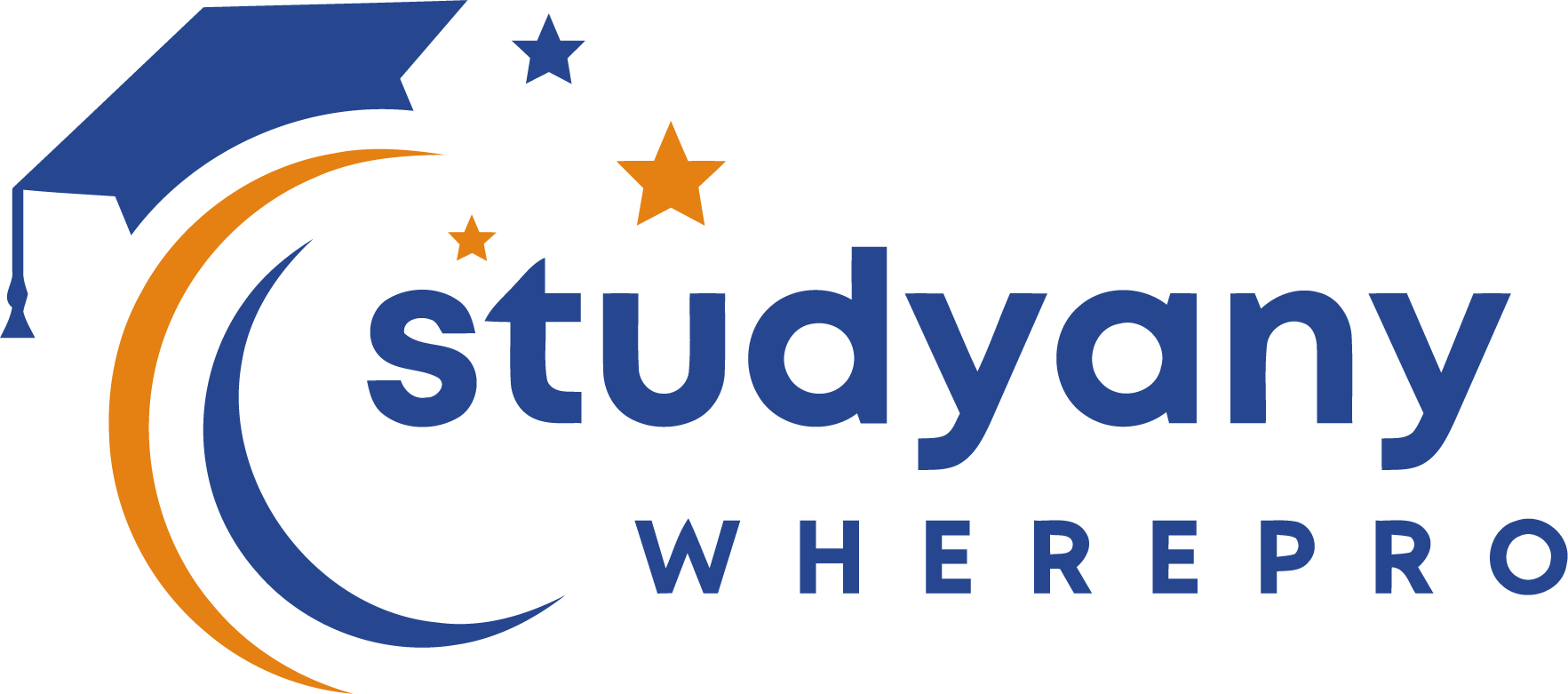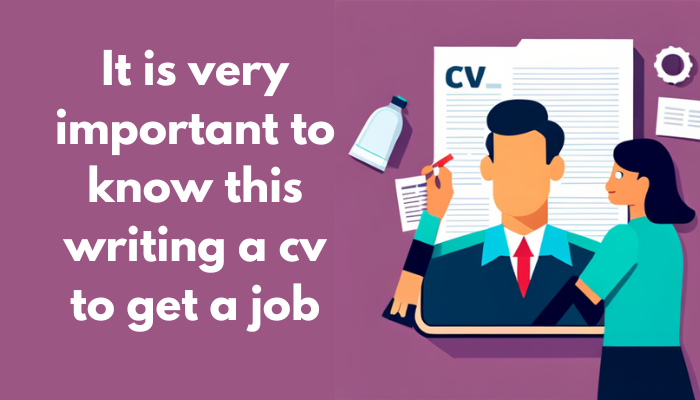Seeking your dream job – writing a cv in 2019 Now, at the very beginning you need a cracking CV. This can be more beneficial for you if you are a fresher student, or experienced one. This guide is designed to help you with all the essential stages of your CV creation.
Why a Great CV Matters

| Aspect | Positive | Negative |
|---|---|---|
| First Impressions | A well-crafted CV creates a strong first impression, making it more likely for a recruiter to be interested. | A great CV can still be overlooked if other factors, like cover letter or interview performance, are lacking. |
| Increased Interview Chances | A strong CV increases the likelihood of being shortlisted for interviews by highlighting relevant skills and experience effectively. | If the CV is too focused on style over substance, it might not accurately reflect the candidate’s capabilities. |
| Professionalism | Demonstrates professionalism and attention to detail, which can set the candidate apart from others. | Overemphasis on design or format might distract from the actual content and qualifications. |
| Clarity and Relevance | Clearly presents skills, experience, and accomplishments, making it easier for employers to see fit for the role. | May require frequent updates and tailoring to stay relevant for different job applications. |
| Career Advancement | A great CV can lead to better job opportunities and career advancement by showcasing qualifications effectively. | A strong CV alone cannot ensure career advancement if the job market is highly competitive or if other aspects (e.g., networking) are neglected. |
This table outlines how a great CV can positively impact job applications while also noting potential
Your CV is, regularly facing an extreme challenge dependent on another business so do whatever it takes not to squander the open door regardless. Just think of it as your marketing toy. An excellent CV can break open doors, a horrible written one will slam them shut immediately. The fact that you apply individually to hundreds of jobs is the key words because employers get through this many CVs per job.
What is a CV?
CV stands for curriculum vitae and is a detailed document describing your experience, education, skillset and accomplishments. While a résumé is usually shorter, the CV gives you more space to sell yourself within your professional life. While needed in academia, research and scientistific positions it is also becoming more prominant in other fields as well.
Understanding the Basics
Base Structure of CV -prior you start your writing work Broadly speaking, a CV includes:
- Contact Information
- Personal Statement
- Work Experience
- Education
- Skills
- Other Categories (e.g., certifications, publications, languages)
- Contact Information
It should be clear and easy for a user to locate your contact information. Include your name, phone number, email address and linked in profile if you have one. Have a clean email address, meaning your best bet is to just use something as close to [email protected] or initialname.lasnam@domain – Just be sure that it sounds professional.
Crafting a Personal Statement
Your personal statement is the opening line to make a good impression. This is a fast section – never more than four sentences (who you are, what benefit does that provide to the company reaching out, and something about your next move) It should be short and about your professional aims the resort industry.
Highlighting Work Experience
The work experience part of your CV is its beating heart. Start with your most recent job and work in reverse chronological order. This should involve listing your job title, company name and the dates in which you worked. Bullet point your duties and accomplishments in the organization, emphasizing how you improved.
Education Section
Education Begin this section with your most recent studies profile in reverse chronological order Put the name of school, what degree you have gotten and years attended for each. Do not forget to mention relevant coursework/projects as a recent grad.
Showcasing Your Skills
It is often your skills that will differentiate you from other applicants. Technical, soft (personal) and language skills Define your skills in detail and mention use cases where you have applied them previously
Additional Sections
Consider adding other sections, such as certifications, publications and languages For those in highly specialized fields or who may be seeking a job that calls for exacting forms of knowledge. These could serve to give some more weight behind your application and showcase all these other great skills you have.
Formatting Tips
Your CV should be legible and professionally laid-out. Clean, professional fonts like Arial or Times New Roman Use a normal-sized font (10-12 points) and sparingly put important text in bold or italics when possible. Make your CV easy to read by plenty of white space.
Tailoring Your CV
There is no such thing as a one size fits all CV. Customise your CV for each application by emphasising the most appropriate experience and skills that you have. Try out the words that are on-demand in the job description and passable through Applicant Tracking Systems.
Proofreading is Essential
Your perfect CV can be ruined by spelling and grammar mistakes. Please proofread your resume at least twice; best if you have a friend/mentor review it also. Fresh focuses on what you might overlook
Use Action Verbs
Begin each bullet point in the job experience section with an active verb For example, saying things like “”” achieved,” “” managed”,””” developed,” and suggested words ending in “ed” can help to make your accomplishments sound significant.” These also say something about your level of responsibility in past positions.
Quantify Your Achievements
Quantify your accomplishments with numbers where you can. Including metrics – e.g., “increased sales by 20%” or, say it with me now… “managed a team of 10 people…” Making your accomplishments measurable will make them tangible and easier for employers to understand.
Keep it Concise
A CV is not mean to be more dense as compared with a résumé or vice versa. Most fields should be 2-3 pages, but at a high level If you include something, it must be related to the job you are trying for.
Be Honest
Avoid the temptation to Lie about skills or experience, because truth is always preferable. You see employers do in fact verify this info as a form of hiring before that job offer is made, and not telling the truth or exaggerating could lose you your job.
Digital vs. Print CVs
Nowadays, with our digital age, many would of course appreciate an automated application. That being said, a hardcopy of your CV never hurts for interviews. Every time you write a follow-up, be sure it is on point in terms of formatting and looks professional.
Why are Cover Letter Much Important?
| Aspect | Positive | Negative |
|---|---|---|
| Personalization | Allows you to personalize your application and directly address the hiring manager, showing genuine interest. | If not well-written, it can come across as insincere or generic, reducing its impact. |
| Showcases Motivation | Demonstrates enthusiasm and motivation for the role, highlighting why you are specifically interested in the position. | A poorly written cover letter may fail to convey genuine interest or enthusiasm, potentially harming your application. |
| Highlights Key Skills | Provides an opportunity to emphasize skills and experiences that are particularly relevant to the job, complementing the CV. | May inadvertently highlight weaknesses or irrelevant experiences if not tailored properly. |
| Differentiates You | Helps differentiate you from other candidates by adding a personal touch and narrative beyond what’s on your CV. | A cover letter that is overly long or verbose can detract from its effectiveness and lose the reader’s interest. |
| Demonstrates Communication Skills | Showcases your written communication skills and attention to detail, which are important for many roles. | Poor grammar, spelling, or formatting can negatively reflect on your communication skills and overall professionalism. |
A good cover letter gives a tailored context to your CV and aids in bringing the whole of the application package together. Then use it to tell them why you are the right person for the job and what makes you different than all of their other candidates.
Leveraging LinkedIn
LinkedIn is a great place to display your work experience and connect with companies looking for someone like you. LinkedInMake sure your LinkedIn profile reflects details from your CV and is up-to-date
Networking Can Help
There may be times when it is not what you know but who you ought to. Networking can provide access to opportunities which might not even be publicised. Go to conferences and meetups in your industry, join professional organizations to get you closer with other professionals.
It is very important to know this writing a cv to get a job
| Pros | Cons |
|---|---|
| Increases Job Opportunities | Time-Consuming: Crafting a well-written CV can be time-consuming and requires careful attention to detail. |
| Showcases Qualifications Effectively | Requires Regular Updates: A CV must be updated frequently to reflect new skills, experiences, and job market trends. |
| Creates a Strong First Impression | Complex Formatting: Overly complex formatting might make it difficult for Applicant Tracking Systems (ATS) to read the CV. |
| Enhances Professionalism | May Not Guarantee Success: A well-written CV alone does not guarantee getting a job; other factors such as interviews and networking also play crucial roles. |
| Highlights Key Achievements | Potential for Misrepresentation: There’s a risk of exaggerating or misrepresenting skills and experiences, which could lead to issues later. |
FAQ
CV vs Resume
Curriculum Vitae, aka CV: A thorough document listing your complete academic and professional backgrounds It is most often used for academic, research or scientific staff positions. The resume is a shorter, streamlined document – evidenced by its two-page limit recommended for most academic job executives – and it should direct the reader to your skills and experiences particular to each position.
How long should my CV be?
CV’s can be any length but 2 to 3 pages is a healthy average measure. It needs to include all your qualifications but remain concise enough for it not bore the reader. Should I Add A Photograph to My CV?
In the US including a image in your CV could be against anti-discrimination laws. Non the less, there will be countries and cultures that expect you to input a photo. Starting all over againIt’s best to apply and mould for thepeople when it comes to job socio norms of country.
Is The Cv Use For Various Job Applications?
This is true; however, it is always a good idea to make relevant changes in base CV for each job application. This type of template will allow you to select and frame your most pertinent experience, skillset and keywords from the job description in order to pass trough Applicant Tracking Systems (ATS) that usually read resumes based on algorithms before potentially reaching recruiters so linking relevant information together would help catch their eye. EMPLOYERS, WILL EXPERIENCE D Another Sentence.
If you are in need of more professional work experience, then highlight these other experiences: Internships Volunteer Work Academic Projects Part-time Jobs Emphasize your transferable skills as well as accomplishments you are able to point out from within these positions which signal an employer that YOU have the potential they need.
Tips on Handling Employment Gaps in Your Resume?
Be honest about things like gaps in employment – it is often best to just put something out there even if you feel odd admitting your truth. There are ways to mention them in your CV / cover letter\v To demonstrate you still remained active, highlight any beneficial pursuits during that period in question (on-going education, freelance projects or volunteer work)
Online application: How should my CV look, and in what format?
If you are applying online, usually PDF version of your CV is best as it will retain formatting. Certain job application systems require a certain format, such as Microsoft Word and you should always follow the instructions from the job posting on how to include references in your CV.
It’s optional. Directly Reference on your CV Instead you can say “References available on request” If an employer is ready, have another list of references available to give.
What order does the CV go?
Generally, you want to start with your contact information then personal statement followed by work experience education skills and any other sections. But feel free to redistribute certain sections in a way that will better draw attention to the qualifications you have for wherever it is your applying.
Work Experience: What action verbs to use at where?
Use action verbs to describe your accomplishments and duties like ” achieved “,” managed”,” developed”,” led”, powered”, or include specific terms in the P field, n designations such as “coordinate”. These make it obvious that you have made valuable contributions.







Your thoroughness in reviewing the work was outstanding. It helped us avoid potential issues and improve the final product.
Thank you very much for your feedback
You have a great ability to stay calm under pressure. Your composed approach helped navigate through the toughest challenges
Thank you very much for your feedback
I appreciate your willingness to take on additional responsibilities. It shows great dedication and professionalism
Thank you very much for your feedback
Your creativity in solving problems is impressive. The solutions you proposed were both practical and innovative
Thank you very much for your feedback
You’ve done a fantastic job of mentoring new team members. Your guidance and support have been invaluable to their development.
Thank you very much for your feedback